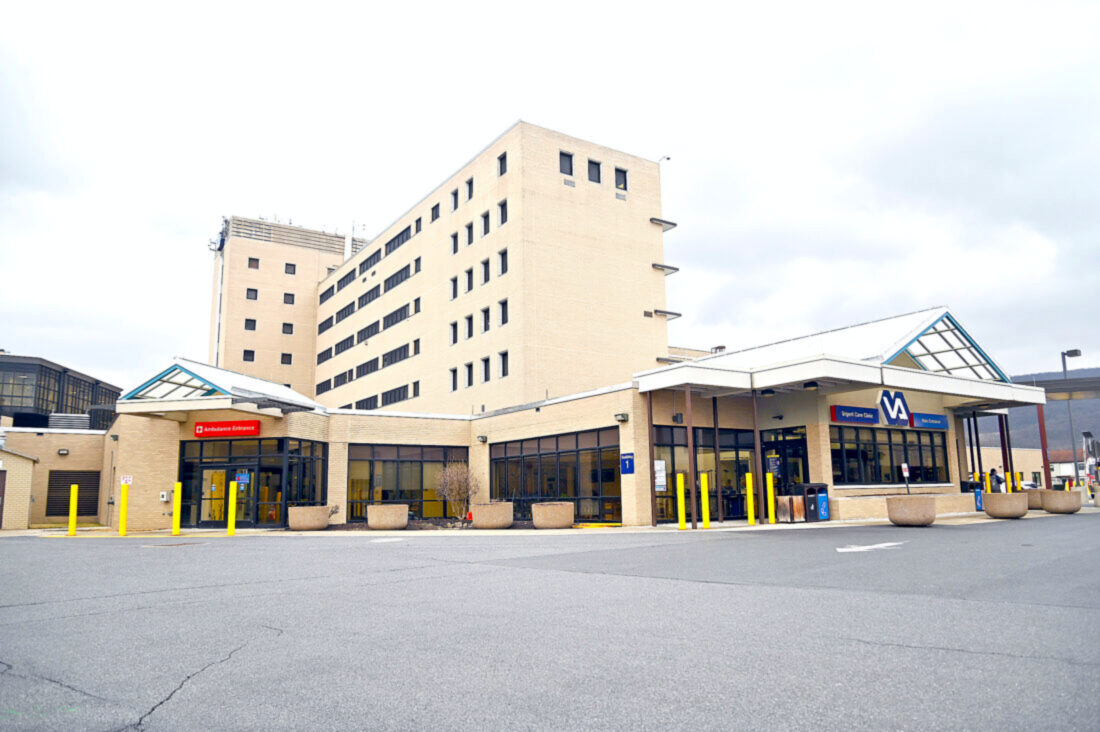Union, VA medical center at odds
Local 1862 lays out worker allegations

PHOTO COURTESY OF THE ALTOONA MIRROR Shown is the entrance to the James E. Van Zandt VA Medical Center, 2907 Pleasant Valley Boulevard, Altoona, on Feb. 27.
ALTOONA — The Van Zandt VA Medical Center is afflicted with workforce problems that include short-staffing, uncompensated extra work, potential violations of federal patient privacy law, a hostile work environment and poor morale, according to the head of the union that represents a little more than 1,000 of the center’s employees.
The VA has rebutted those claims, one-by-one.
Staff reductions
Between February and December of 2024, the center eliminated 170 positions, based on its being $25 million over budget, which aligned with national budget concerns, according to Jenn Soult, president of the American Federation of Government Employees Local 1862.
The reductions were accomplished through a hiring freeze and attrition, with positions eliminated after workers quit or retired, with help from a Deferred Resignation Program and voluntary early retirement, according to Soult.
An additional 55 employees have left since mid-January of this year because of the threat of further cuts, she said.
A Reduction in Force proposal was introduced, although it isn’t to be implemented fully.
Positions eliminated include administrators, doctors, nurses and social workers, Soult said, including mission-critical positions.
It’s true that some areas were overstaffed before the cuts began, mainly due to COVID, but the cuts have gone too far, she said.
According to Soult, the workforce shrinkage fed on itself, as workloads of providers — physicians, certified nurse practitioners and physician assistants — increased, and employees were asked to do tasks that were beyond their job descriptions, leading more providers to retire due to overwork and burnout.
The erosion of morale from the overwork spread to others on the providers’ teams, including registered nurses, licensed practical nurses, certified nursing assistants and medical support assistants, who verify patient identities and adjust patient schedules, according to Soult.
Medical support assistants, who are responsible for verifying patients’ identities and dealing with scheduling adjustments, have turned over “like a revolving door,” she said.
Budget shortfall felt
nationally
The union is correct about the 2024 budget shortfall, which was a national VA phenomenon, according to Van Zandt spokeswoman Rachael Moreland, who worked with the national VA on responses to the local union’s allegations.
Van Zandt management locally and nationally dealt with the shortfall by reviewing “position requests, contract requests and other purchase requests more closely, and some employees were not replaced through attrition,” the VA stated. “(But) patient care was not impacted by these decisions.” Moreover, there is no budget shortfall in 2025, according to the VA.
“Wait times remain better than the national average, the Altoona facility is ranked second among VA facilities for Veteran trust scores, and the facility was recognized as providing the best Veteran experience among small facilities in 2024,” the VA stated.
Privacy violations alleged
National-level orders from the VA that employees who’d been working at home need to come back to the hospital led to a handful of employees routinely discussing mental health issues with patients over the phone in the same room at the hospital, inevitably resulting in privacy law violations, according to Soult.
Even though employees used headphones, so patients’ voices couldn’t be heard by other employees, the other employees could nevertheless hear patient names and their medical issues discussed, when colleagues confirmed patient identities and the issues they were dealing with, she said.
“We brought this up to the executive leadership, but it fell on deaf ears,” Soult said. “As long as everybody had a seat was their concern.”
In other cases, employees such as social workers, mental health providers, physicians, physician assistants and community care staffers have been sharing spaces such that when called on to do face-to-face care, had to find private space for it — which is not always easy or convenient, Soult said.
The VA contests those allegations.
“This is false,” stated the VA. “This facility has not been charged with any HIPAA violations as a result of VA’s return to in-office work policy. When employees work in a shared office space, they are given private work space as needed to meet confidentially with veterans.”
All VA employees receive training on HIPAA compliance, “so the notion that bringing employees back to the office somehow poses a privacy risk is specious and dishonest,” the VA stated.
As for employees who work together needing to go to a private space for face-to-face interactions with patients: based on the Patient Aligned Care Team model used at Van Zandt, “providers are not assigned individual offices or exam rooms at the facility, (but) they are given private work space as needed to meet confidentially with veterans.”
The VA “is making accommodations as needed so employees have enough space to work and will always ensure that veterans’ access to benefits and services remains uninterrupted as employees return to in-person work,” the VA stated. The goal is “to bring back as many employees to the office as mission and space permits, so we can work together as a team to deliver veterans the best care and services possible,” the VA stated. The policy allows for exceptions when there is inadequate space.
Issues aired over
unpaid work
In some cases, care providers haven’t been able to take lunch, because their schedules are so packed, Soult said, adding that some employees are not being compensated at all for overtime they’re using to complete documentation connected with employee care and other, similar tasks. It’s happening because the hospital director has instructed supervisors not to approve overtime for employees unless those employees are providing face-to-face care to patients at that time, Soult said. “You’re supposed to figure out how to get administrative work done on your own,” she said.
In some cases, providers haven’t been paid anything for overtime work because they’ve been unwilling to interrupt sessions with patients to get the necessary prior approval for overtime, Soult said.
Providers aren’t happy to work for free, but employees dedicated to their jobs and to their patients will often use their own time to ensure those patients get the care they need, she said. Providers also don’t want to jeopardize their professional licenses by stinting on care, she added.
When people complain, Soult said management tells them to manage their time better. Management has employees “over a barrel,” she said, noting it’s unfair and illegal for those employees to be uncompensated for their time.
In response to the allegations that some employees are not being properly compensated, the VA stated “this is false.”
“Providers are not expected or advised to complete work on personal time,” the VA stated. “Providers have administrative time built into their schedules, (and) (d)ocumentation and charting should be done during this allocated time.”
To help with the issue, management has “reviewed providers’ productivity and workload data, providing suggestions about opportunities to improve workflow efficiency and time management,” the VA stated.
It’s also false that employees must forgo getting paid for working overtime if face-to-face sessions run up against quitting time, the VA stated.
“The James E. Van Zandt VA Medical Center does pay overtime and grants compensatory time off when approved by the employee’s supervisor,” the VA stated. “Prior approval is generally needed, but approval after the fact is considered in specific situations, to include situations where the patient is face-to-face with the provider.”
Working out issues
cumbersome
Soult said the hospital and its employees should be able to work out contentious issues through face-to-face meetings or through mediation, but management has pushed cases such as hostile work environment issues like bullying, harassment and discrimination to the Equal Employment Opportunity Commission — favoring a process that is cumbersome, time-consuming, costly and conducive to continuation of problematic behavior.
In one case, there was documentation that management instructed supervisors not to engage with the union over issues or to “put fires out,” Soult said. Ironically, a management policy that discourages written communication with workers makes it harder for the union to document problems, and thus harder to correct them without resorting to the formal EEOC process, she said.
There are seven EEOC complaints ongoing, according to Soult, though the VA said there are six ongoing cases.
“Alternative dispute resolution, which includes mediation, is offered when applicable in Equal Employment Opportunity (EEO) cases,” the VA stated. “Management rarely declines a request to mediate a matter.”
However, with mediation, both parties must agree to the resolution, the VA stated. If not, an EEO complaint may be filed. Any VA employee has the right to file an EEO complaint, and the VA takes those seriously and investigates them appropriately, the VA stated.
As for concerns that EEO investigations take a long time and are expensive, the VA asked, “Does the union not support the Civil Rights Act of 1964 and the rights it bestows on VA employees?”
Pharmacy case among issues
One matter saw the union representing 27 people in connection to a pharmacy investigation, where a pharmacy service chief created a local drug formulary that differed from the national list. That was in violation of VA policy and led to objections from senior staffers, whose privileges were revoked. A clinical pharmacist ended up in an office where she did nothing for nine weeks — although she continued to be paid, Soult said. The pharmacist was restored to her duties, under administrative review, but with management trying to fire her, Soult reported, noting such instances tend to damage employee morale.
In this case, the VA said that management investigated the allegations connected with the pharmacy service and the service “has demonstrated improvement,” although the VA can’t comment on “individual personnel matters.”
Unprofessional, harassing comments
Three EEOC complaints resulted from a service chief and a supervisor allowing unprofessional and sexually harassing comments in a service line team chat, according to Soult. One such comment was “Did I miss the orgy invitation?” Soult said. Another referenced a Christmas party and getting drunk, she said. Another referenced getting “more tricks than standing on a corner” in a nearby city.
The complaints led to the service chief holding a meeting at which he said he wouldn’t be held hostage to the personal feelings of complainants, Soult said. The hospital director was made aware of the matter and did nothing about it, she said.
The VA said that isn’t true.
“The facility investigated and addressed a situation involving facts similar to those posed by this allegation,” the VA stated. “The matter was successfully resolved and there have been zero new complaints regarding unprofessional comments within the service line since counseling occurred.”
Due process violations
alleged
A “Chime-In” initiative allows employees to file allegations of policy and procedure violations anonymously, which can lead to disciplinary action against accused individuals, potentially violating due process, pitting employees against one another and contributing to the hostile work environment, Soult said.
In one case, a certified caregiver was victimized by an anonymous allegation that was eventually proven to be unfounded, but during the investigation, the caregiver was sent to be a front desk greeter at lower pay, leading to speculation among employees about what the caregiver might have done to deserve punishment, according to Soult. It created a Scarlet Letter-type stigma, she said.
In its response, the VA said “Chime-In protects whistleblowers and facilitates their disclosures. … Does the union not support whistleblowers?”
‘Hunger Games’ mindset
While it wasn’t put into practice, the Reduction in Force program’s introduction helped create a “Hunger Games” atmosphere at the center, because it could have led to employees whose jobs were eliminated being able to “bump” into other jobs, based on seniority, Soult said.
Another contributor to the “Hunger Games” mindset is the management policy of sending invitations to employees to report examples of fraud and abuse to their supervisors, she said.
“People are fearful to come to work,” Soult said. “If they make a mistake, who is watching? Will someone turn them in?” she said.
“Staff have no sense of job security and little faith that the leadership team even fought to show they are essential to the facility operations,” Soult wrote in an indirect exchange with the VA, after the VA was asked for comment on the union’s allegations. “Staff are afraid to speak up to ruffle any feathers in fear that will get them added to a reduction list or affect their annual performance appraisals. Even though retaliation is prohibited, it absolutely happens.”
When told of the allegations made by Soult, the VA suggested that the Mirror ask for specific examples of retaliation “so we can look into it.” In the absence of details “this is an unfounded allegation,” the VA stated.
“VA provides training and information to all employees encouraging them to report any concerns and to do so without fear of retaliation,” the VA stated. “Should an employee raise a concern of retaliation for making a protected disclosure, it would be investigated and addressed, as appropriate.”
While the VA claims they would look into specific examples provided by Soult, she replied that they are “aware of all of it. …They want me to go on record with names, because that would be a violation of VA policy and potential grounds for termination.”
Mistrust and harassment alleged
A now-former employee has an ongoing harassment case against VA management after they said they were treated with an offensive degree of mistrust. For instance, they worked at the organization’s outpatient clinic in Johnstown and were required periodically to prove they were at the site in Johnstown by FaceTiming with management with a clinic sign or parked federal vehicles in the background, the employee said.
The employee was also required to do two jobs while getting paid for one, working primarily as a greeter or “redcoat” but also responsible for scheduling for the Disabled American Veterans transportation program, because of short-staffing.
Her regular hours as a greeter were 7:30 a.m. to 4 p.m., but she had to make calls as early as 5 a.m. and then after work into the evening to deal with driver call-offs and veteran clients needing information about their rides, the employee said.
In spite of doing this extra work without extra pay, the employee said she was “harassed” by the person in charge of volunteer services for not being at the employee’s greeter station during the day when occupied elsewhere with scheduling duties.
The employee filed a grievance with the union and an HR representative from another VA medical center heard the case and ruled in the employee’s favor, according to the employee.
Management argued at the hearing that the employee should not answer phones before the employee’s regular shift, but that during the employee’s regular hours should be able to work both positions and give sufficient attention to both, according to the employee.
The hearing officer ordered that management should either give the employee a raise or take away the DAV scheduling duties. Management opted to take the scheduling duties away, according to the employee.
The employee would have preferred that the hearing officer had ruled for a raise that reflected the dual responsibilities, provided the harassment ended — including harassment connected with not being able to be in two places at once, the employee said.
“(That) would have helped me in a sense feel rewarded,” the employee said.
The harassment continued even after the employee’s scheduling duties were removed.
There was also gossiping about the employee, as evidenced by conversations that were overheard, according to the employee.
She decided to resign in the middle of July, stating it was best of her mental and physical health, but and was denied entrance into the organization’s deferred resignation program, based on her position being deemed “mission critical” — a designation that didn’t make sense, given that it didn’t apply to the organization’s associate director, whose deferred resignation request was accepted, the employee said.
Stress related to the work at Van Zandt had caused the employee to lose 50 pounds and much hair, the employee said.
In response to this case, the VA said it “cannot comment on any ongoing EEO investigations but VA takes all allegations of misconduct or discrimination seriously and takes corrective action when necessary.”






